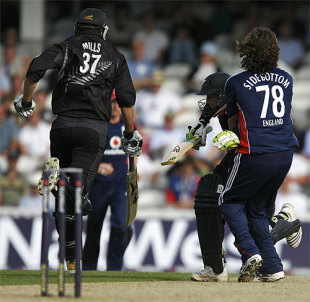|
|
|

Ryan Sidebottom collides with Grant Elliott during a fiery encounter at The Oval
© Getty Images
|
|
| |
There is life in the old dog yet. Twenty20 was supposed to act as the poison to kill off 50-over cricket once and for all. Yet on a thrilling day at The Oval, amid no shortage of controversy, a packed crowd was kept waiting until the last ball to see New Zealand clinch a breathless win by one wicket and, in doing so, they were handed justice.
Admittedly, the standard of cricket from either team was not of the absolute highest quality, yet the match lasted the distance and was neatly balanced between bat and ball. This has been the dissenters' bugbear with Twenty20's dominance. Though scores in the Twenty20 Cup this season have been slightly less than last year, batsmen continue to act as the format's greedy overlords; bowlers are their submissive and occasionally hapless servants, as Graham Napier's astonishing 58-ball 152 demonstrated yesterday.
Fifty-over cricket receives plenty of knocks, not least the period between the 25th and 40th overs - the sticky sinking-sand of an innings. No such complaint can be made about today's seesaw encounter, however, which ebbed and flowed until the end. 50-over cricket is a favourite of the fan, the administrator, and the money men. Like a slightly dysfunctional family, all three formats of this game can coexist peacefully if they learn from one another.
Of course, today's game was given the most vicarious of backdrops, when the England captain decided against withdrawing his appeal of Grant Elliott, who had unfortunately collided mid-pitch with Ryan Sidebottom. Elliott was flattened like a roadside hedgehog, New Zealand's changing room erupting into visible fury, incensed that a victory - they only needed a further 26 from 38 balls - and a series-lead was about to be stolen from their waiting grasp. Had Collingwood crossed the line of decency, conveniently forgetting about the spirit of the game? Had Sidebottom?
"In the heat of the moment, a quick decision had to be made," Collingwood reasoned. "Both players collided. I asked Sidebottom straight away: 'were you going for the ball?' He said, 100%, that he was going for the ball, for the run-out. [It was a] split second decision in a tight game, with emotions running high. The umpire asked me if I wanted to uphold my appeal, and I said I was still appealing.
"I've never been in that situation before. I don't think I've even been on the field as a player [when a decision like that has been made]. In hindsight I wish I had called him back. You come off the pitch and wonder if you should have done things differently. I hold my hands up and say I probably made the wrong decision, and that is something that I will have to live with. As a captain I was thinking, 'What is the right or wrong thing to do here? I've shook hands with Daniel Vettori on the pitch, and spoken together, and hopefully everything will be okay."
The irony of England's aggression was not lost on Collingwood. Only four days ago he rued his side's lack of ruthlessness in their rather weak performance in Bristol, yet here it was that very essence which sent their emotions spiralling out of control. New Zealand might have been apoplectic with rage off the field, but on it, Kyle Mills and Mark Gillespie remained unnervingly cool with two needed off the final delivery. England did not: three fielders converged to the stumps, waiting for Graeme Swann's throw from cover as New Zealand set off for a single, but a rocket was launched at the base of the stumps, skidding through for overthrows.
"The players went to the stumps to get the lob, and [Swann] aimed at the stumps. There is no blame at all at Swanny," Collingwood said. "Those situations don't come around very often, those real last-ball preparations, and maybe again he'd have lobbed it up to the players. When you've got an opportunity there to win a game, a lot of players just try to take that."
Justice had been served, and although New Zealand's adrenaline-fuelled celebrations on the balcony was an unsightly and explicit reaction, it was with some relief that the frenzy was doused so quickly after the match's conclusion.
"First of all, I'd like to apologise properly for some of our team's reactions - my reaction as well - at the end of the game," Vettori said. "They were a little bit over the top. I've spoken to Paul [Collingwood] about it and the coach, Peter Moores, and I just wanted to get that out in the open. It was a game that I think we deserved to win, but it would have been nice if it was played out in the manner that it should have been, and then the game would've seen the right result and the right win.
"We couldn't understand it up there. I'd like to think it's a decision that I won't ever have to make, but if I do, it'll be the right one. Paul's come and spoken to us and apologised, and acted contrite, so we'll move on from the situation and hopefully it won't happen again."
For all today's last-minute ugliness in the heat of the battle, it helped enliven an already enthralling contest between two pleasingly even sides. 50-over cricket might not be suffering from the cardiac arrest its dissenters continue to diagnose after all.
Will Luke is a staff writer at Cricinfo
